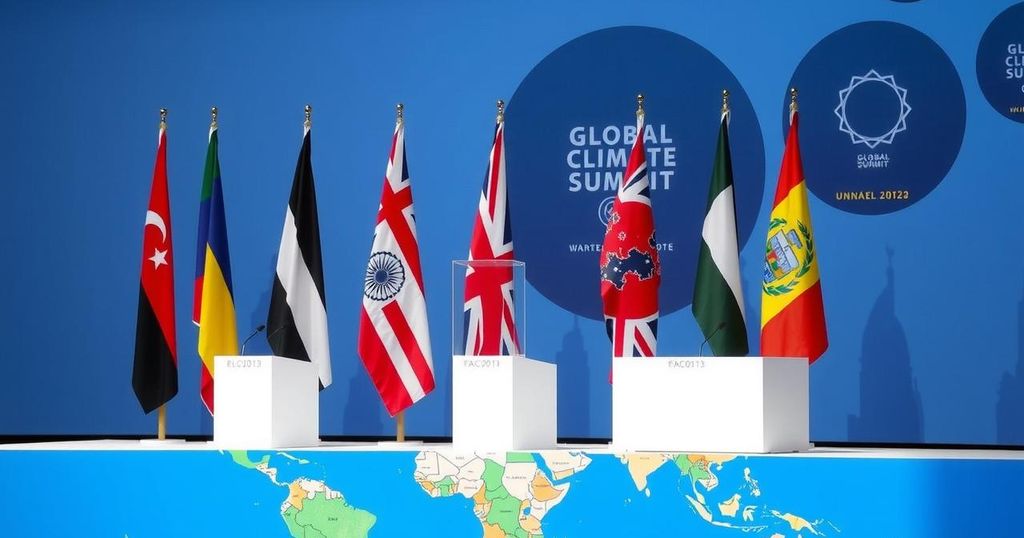COP29: A Crucible of Political Discord and Climate Challenges

The conclusion of COP29 in Baku revealed significant challenges in climate diplomacy, marked by political dysfunction, inadequate commitments, and the rise of populism. Global leaders failed to establish a cohesive strategy to tackle the escalating climate crisis, underscored by adverse weather events worldwide. The summit’s limited outcomes reflect the growing frustration of developing nations and highlight the urgent need for reformed climate governance as the world approaches COP30 in Brazil.
The COP29 summit concluded in Baku, Azerbaijan, leaving behind a landscape fraught with political discord and ineffective environmental commitments amidst the rise of populism. Instead of fostering international unity against climate change, the summit became a display of geopolitical tensions and populist rejection of scientific consensus. As the climate crisis escalates with alarming speed, characterized by severe weather events globally, the limited outcomes of COP29 underscore the difficulties in advancing climate diplomacy in an increasingly divided world.
Arriving at a critical moment, the summit coincided with a significant uptick in climate disasters, such as intense droughts in East Africa and devastating wildfires in southern Europe. Notably, Asia faced extraordinary challenges this year, with 79 water-related disasters, including India’s record-breaking heat wave, which reached 50.5°C, resulting in substantial casualties. Meanwhile, Latin America witnessed heightened deforestation in the Amazon and catastrophic flooding in Libya, illustrating the urgent need for global climate action, which COP29 struggled to address adequately.
The shadow of populism loomed large over COP29, particularly following the re-election of Donald Trump, whose administration has historically exhibited skepticism towards climate initiatives and multilateral agreements. Trump’s potential withdrawal from the Paris Agreement poses a substantial setback to global climate efforts, potentially encouraging other leaders to shift focus away from environmental initiatives.
The exit of Argentina from negotiations, led by President Javier Milei, who refers to climate change as a “socialist lie”, further illustrates the detrimental impact of populist politics on meaningful climate discussions. This realignment towards prioritizing immediate economic concerns over environmental sustainability signals a troubling trend among global leaders that diminishes the collective effort needed for climate action.
Amidst these challenges, the absence of significant political leaders like Emmanuel Macron and Olaf Scholz at COP29 created a leadership void, limiting the progress and strength of collective commitments. Without robust representation from major powers, developing nations, particularly in the Global South, expressed their discontent with the sidelining of climate justice, which is crucial for equitable progress in climate negotiations.
Geopolitical tensions further complicated the proceedings at COP29. The strained relations between Azerbaijan and France, along with the US-China rivalry, highlighted how national interests can obstruct cooperative climate agreements. Azerbaijan’s reliance on fossil fuels presented a paradox in hosting a climate summit designed to promote clean energy initiatives, raising questions about the genuine commitment to global climate goals.
Despite these setbacks, COP29 yielded some positive developments, with over 200 countries committing to significantly increase climate finance to developing nations, promising at least $300 billion annually by 2035. Additionally, notable commitments from asset owners and the UK to reduce emissions reflected a flicker of hope amidst the political turmoil.
The summit must be viewed as both a cautionary tale and a call to action for the future of climate diplomacy. To restore faith in global efforts, nations must recommit to their financial pledges and embrace a more inclusive approach that acknowledges the responsibilities of both developed and emerging economies. Moreover, the role of middle powers and subnational entities is paramount, as their contributions can fill the gaps left by national leaders.
As the global community prepares for COP30 in Brazil, the pressing nature of climate issues demands that nations collectively rise to the occasion and take meaningful strides toward mitigating the climate crisis. The journey toward effective climate diplomacy will require overcoming the significant challenges posed by populism and geopolitical divides, lest the opportunity for substantial action slip away permanently.
The global climate crisis continues to escalate, with 2023 witnessing unprecedented weather events that have exacerbated existing vulnerabilities. Deteriorating conditions globally, such as extreme heat, floods, and wildfires, underscore the urgency of international cooperation to address climate change. Historically, climate summits like COP29 are positioned as collaborative platforms for establishing commitments to reduce emissions and facilitate climate finance, yet rising populism and geopolitical tensions have increasingly hampered effective discourse. COP29 specifically was marred by the re-emergence of populist leaders skeptical of climate science and commitments, alongside significant absences of key decision-makers, resulting in minimal progress in addressing urgent climate issues.
The aftermath of COP29 highlights the crucial need for revitalizing global climate diplomacy amidst increasing populism and geopolitical friction. Nations must recommit to their climate obligations, ensuring accountability to foster trust and inclusivity in future negotiations. The involvement of middle powers and subnational actors offers a pathway to bridge the leadership gaps and drive impactful initiatives. As the world looks ahead to COP30 in Brazil, the imperative to confront the climate crisis with urgency and unity cannot be overstated.
Original Source: m.thewire.in






